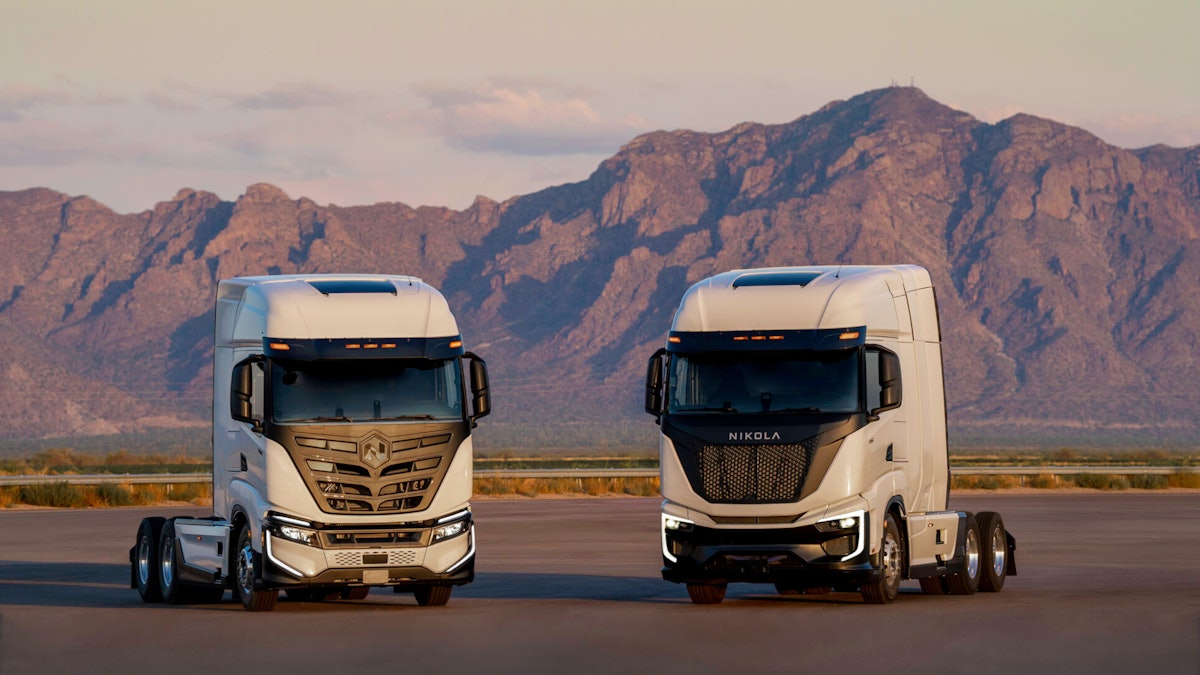Owner Operators visit; https://masters.eye1.net
https://img.overdriveonline.com/files/base/randallreilly/all/image/2024/12/FCEV_BEV_DSC07136_HERO_Coolidge_scaled__1_.675b55b09ff75.png?auto=format,compress&fit=max&q=70&rect=0,810,1927,1084&w=1200
Nikola (NKLA) is facing its most serious existential threat to date as it struggles to financially remain afloat, confirming in an SEC filing earlier this week that it lacks the funds to survive through the next business quarter.
The Phoenix, Arizona-headquartered manufacturer of battery-electric and hydrogen fuel cell Class 8 semis also confirmed it had reduced its workforce in October and December “in order to better align our staffing with our current needs.”
What’s most concerning is Nikola’s admission that it’s hemorrhaging money at an alarming rate.
“We currently estimate that our existing financial resources are only adequate to fund our forecasted operating costs and meet our obligations into, but not through, the first quarter of 2025.”
Last month, Nikola released its Q3 financial report which stated that it lost $2.75 per share and managed a revenue of almost $25.2 million. It initially estimated a revenue of $37.2 million. Cash and equivalents dropped to $198.3 million compared to $464.7 million at the end of 2023.
[Related: Nikola’s Q3 results worse than expected, shares drop]
The company further disclosed that it secured a $65 million deal with noteholders in order to keep it alive, but that amount is projected to be sufficient for only a month. Concurrently, Nikola is actively trying to raise $100 million by selling more shares. This process began a few days ago and there’s no word yet as to when it’ll close the offering.
Unfortunately, the company’s troubles don’t end there. Nikola still has not paid some $80 million of a $125 million settlement to shareholders following the downfall of former CEO Trevor Milton, who was convicted of fraud in federal court and sentenced to four years in prison. Milton deliberately misled investors regarding the company’s financial health and its products’ operational capabilities. Nikola has since been sued by other shareholders and suppliers.
Along with its financial situation, Nikola previously had to recall its entire battery-electric semi fleet of over 200 units due to several trucks catching fire. The problem was resolved and Nikola launched the Tre BEV 2.0 last May.
[Related: Nikola’s CEO and software chief provide exclusive walkthrough of improved BEV 2.0]
Nikola did not respond for comment at the time of this writing.
William Hall, owner of Coyote Container and the first Nikola Tre FCEV operator in California told Clean Trucking that he can see Nikola’s insolvency affecting owner-operators in several ways, such as the lack of vehicle maintenance and diagnostics support.
“Based on my experience, I would not operate the truck without this service. In the long term, the truck would likely not continue to function without warranty support from the OEM,” Hall stated.
[Related: FCEV early adopter’s operational concerns come to life]
He also expressed concern about a potentially “compromised” hydrogen supply, pricing, and availability because it’s currently provided to him and others via Nikola’s HYLA mobile H2 refueler network and partner supply agreements. Certified Nikola dealer support could also be affected.
Jay Traugott has covered the automotive and transportation sector for over a decade and now serves as Senior Editor for Clean Trucking. He holds a drifting license and has driven on some of the world’s best race tracks, including the Nurburgring and Spa. He lives near Boulder, Colorado, and spends his free time snowboarding, climbing, and hiking. He can be reached at [email protected].
